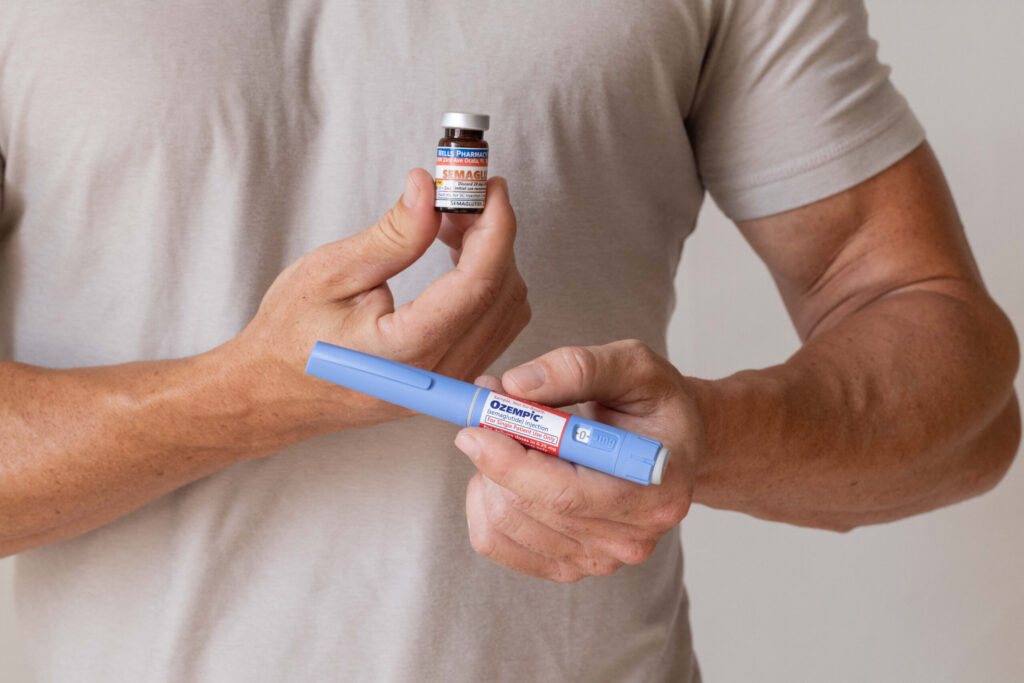Erectile dysfunction (ED) is a widespread yet sensitive concern affecting countless men, often influenced by physical, emotional, or lifestyle factors. With the rising popularity of Ozempic—a GLP-1 receptor agonist widely prescribed for Type 2 diabetes management and weight loss—some individuals have raised questions about its potential impact on sexual health. While Ozempic is celebrated for its ability to regulate blood sugar and support weight loss, concerns about its role in contributing to ED have emerged.
In this blog, we’ll examine the science behind Ozempic, investigate any possible links to erectile dysfunction, and provide guidance on addressing sexual health concerns while using this medication.
Understanding Ozempic and How it Works
Ozempic, or semaglutide, is a prescription medication used to manage blood sugar levels in adults with type 2 diabetes. It belongs to the GLP-1 receptor agonist class of drugs, which mimic the effects of the hormone glucagon-like peptide-1. This hormone is vital for blood sugar regulation and appetite control. Ozempic is also widely used for weight loss, especially in individuals who are overweight or obese. Administered as a once-weekly injection, it is often combined with lifestyle changes like a healthy diet and regular exercise for optimal results.

The medication works through multiple mechanisms. It stimulates insulin release from the pancreas in response to elevated blood sugar, aiding glucose transport into cells for energy. At the same time, it suppresses glucagon secretion, reducing the liver’s release of stored glucose and helping to prevent blood sugar spikes. Additionally, Ozempic slows gastric emptying, delaying the absorption of glucose into the bloodstream after meals. It also interacts with brain centers that regulate appetite, promoting a feeling of fullness and helping reduce calorie intake.
Recommended: Where do You Put TENS Pads for Erectile Dysfunction?
Beyond managing blood sugar, Ozempic offers significant weight loss benefits, improving overall health and reducing obesity-related complications. It has also been shown to lower the risk of major cardiovascular events like heart attacks and strokes in individuals with type 2 diabetes and pre-existing heart conditions. These additional advantages make it a valuable treatment option for patients managing both diabetes and weight-related health concerns.
While effective, Ozempic can cause side effects, particularly when beginning treatment. Common issues include nausea, vomiting, diarrhea, abdominal discomfort, and fatigue, though these symptoms typically subside over time.
Does Ozempic Cause Erectile Dysfunction?
Ozempic (semaglutide) is not known to directly cause erectile dysfunction. However, some side effects and health factors associated with its use may temporarily impact sexual performance. Fatigue, a common side effect, can lower energy levels and reduce interest in sexual activity. Gastrointestinal symptoms like nausea, vomiting, or diarrhea can affect overall well-being and comfort, which may indirectly influence erectile function. Prolonged side effects leading to dehydration can impair circulation and energy, both of which are vital for maintaining erections. Additionally, the blood sugar-lowering effects of Ozempic may sometimes result in hypoglycemia, causing symptoms like dizziness, fatigue, or confusion that could impact sexual performance.
On the other hand, Ozempic may support improvements in erectile function by addressing underlying conditions such as diabetes and obesity. By enhancing blood sugar control, it can mitigate nerve and vascular damage caused by diabetes. Its weight loss benefits can improve cardiovascular health, boost testosterone levels, and enhance self-confidence, all of which are essential for better erectile function. Although it is unlikely to directly cause ED, any noticeable changes in erectile health during Ozempic use should be discussed with a healthcare professional.
Recommended: Best Chinese Herbs For Erectile Dysfunction
Impact of Ozempic on Erectile Function
Ozempic (semaglutide) is primarily prescribed for managing type 2 diabetes and promoting weight loss, but its effects on erectile function have also been explored, particularly in individuals with underlying conditions such as diabetes, obesity, and cardiovascular issues. Although it is not specifically approved for treating erectile dysfunction (ED), Ozempic may have an indirect positive impact on erectile function through the following mechanisms:
Improved Blood Sugar Control
Diabetes is a major contributor to ED, as high blood sugar levels can damage blood vessels and nerves essential for erectile function. Ozempic helps regulate blood sugar by increasing insulin secretion, reducing glucose production in the liver, and improving insulin sensitivity. By managing blood sugar more effectively, Ozempic may reduce the risk of vascular and nerve damage associated with diabetic ED.
Recommended: Is Ginger Tea Good For Prostate Enlargement?
Weight Loss
Obesity is another significant factor in ED, as it can lead to reduced testosterone levels, impaired blood flow, and increased inflammation. Ozempic helps with weight loss by suppressing appetite and slowing gastric emptying, leading to a reduction in calorie intake. Weight loss can improve blood circulation, restore hormonal balance, and potentially improve erectile function by addressing underlying obesity-related issues.
Cardiovascular Health
Good blood flow is crucial for erectile function, and Ozempic’s cardiovascular benefits may contribute to better erectile health. The medication has been shown to lower the risk of cardiovascular events and improve arterial health. Enhanced blood flow from improved cardiovascular health may positively impact erections, particularly in individuals with conditions like hypertension or atherosclerosis.
Reduction in Inflammation
Chronic inflammation associated with diabetes and obesity can negatively affect erectile health. Ozempic has anti-inflammatory effects, which may help reduce inflammation in the body, thereby promoting better erectile function.
Hormonal Balance

Ozempic can help regulate hormones such as testosterone by improving insulin sensitivity and promoting weight loss. Restoring hormonal balance is vital for sexual health and may lead to improved libido and erectile function.
Psychological Benefits
The physical improvements resulting from Ozempic—such as better blood sugar control, weight loss, and cardiovascular health—can boost confidence and reduce anxiety related to sexual performance. This psychological improvement may also help alleviate stress or performance anxiety, which are common contributors to ED.
Recommended: Is Ginger Tea Good For Prostate Enlargement?
What to Do If You Experience ED While Taking Ozempic
If you experience erectile dysfunction (ED) while taking Ozempic, it’s important to address the issue comprehensively, considering both potential side effects of the medication and underlying health factors. Here’s what you can do:
Consult Your Healthcare Provider

Speak with your doctor to determine if Ozempic is contributing to your ED. They can evaluate your overall health, review any other medications you’re taking, and assess whether the ED is related to diabetes, cardiovascular issues, or another underlying condition.
Monitor Blood Sugar Levels
Ensure your blood sugar levels are well-controlled, as poor glycemic control can worsen ED. If you experience symptoms of hypoglycemia, such as dizziness or fatigue, work with your healthcare provider to adjust your diabetes management plan.
Stay Hydrated
Address dehydration, which may result from gastrointestinal side effects like nausea or diarrhea. Proper hydration supports healthy blood circulation, which is crucial for erectile function.
Evaluate Lifestyle Factors
Focus on maintaining a healthy lifestyle, including regular exercise, a balanced diet, and sufficient sleep. These habits can improve energy levels, cardiovascular health, and hormone balance, all of which are essential for sexual performance.
Manage Stress and Mental Health
Psychological factors, such as stress, anxiety, or low self-esteem, can exacerbate ED. Consider seeking support through therapy or counseling, and practice stress-reduction techniques like meditation or relaxation exercises.
Consider ED Treatments
Depending on the underlying cause of your ED, your doctor may suggest medications like phosphodiesterase inhibitors (e.g., sildenafil or tadalafil) or other treatments specifically designed to improve erectile function.
Monitor Weight and Cardiovascular Health
If obesity or poor cardiovascular health is contributing to ED, continue using Ozempic to support weight loss and improved circulation, as these factors often lead to better sexual function over time.
Stay Patient
Some side effects of Ozempic, such as fatigue or gastrointestinal discomfort, are temporary and may resolve as your body adjusts to the medication. Monitor your symptoms and report any ongoing concerns to your doctor.
Conclusion
While Ozempic (semaglutide) is unlikely to directly cause erectile dysfunction (ED), its potential side effects, such as fatigue, gastrointestinal discomfort, or hypoglycemia, can indirectly influence sexual function. At the same time, Ozempic’s benefits—such as improved blood sugar control, weight loss, and better cardiovascular health—can positively impact underlying causes of ED, particularly in individuals with diabetes or obesity.
If ED occurs while using Ozempic, addressing it comprehensively—through medical consultation, lifestyle adjustments, and targeted treatments—can help restore sexual function and overall well-being. It’s essential to monitor symptoms, maintain open communication with your healthcare provider, and focus on improving both physical and mental health for effective management.
